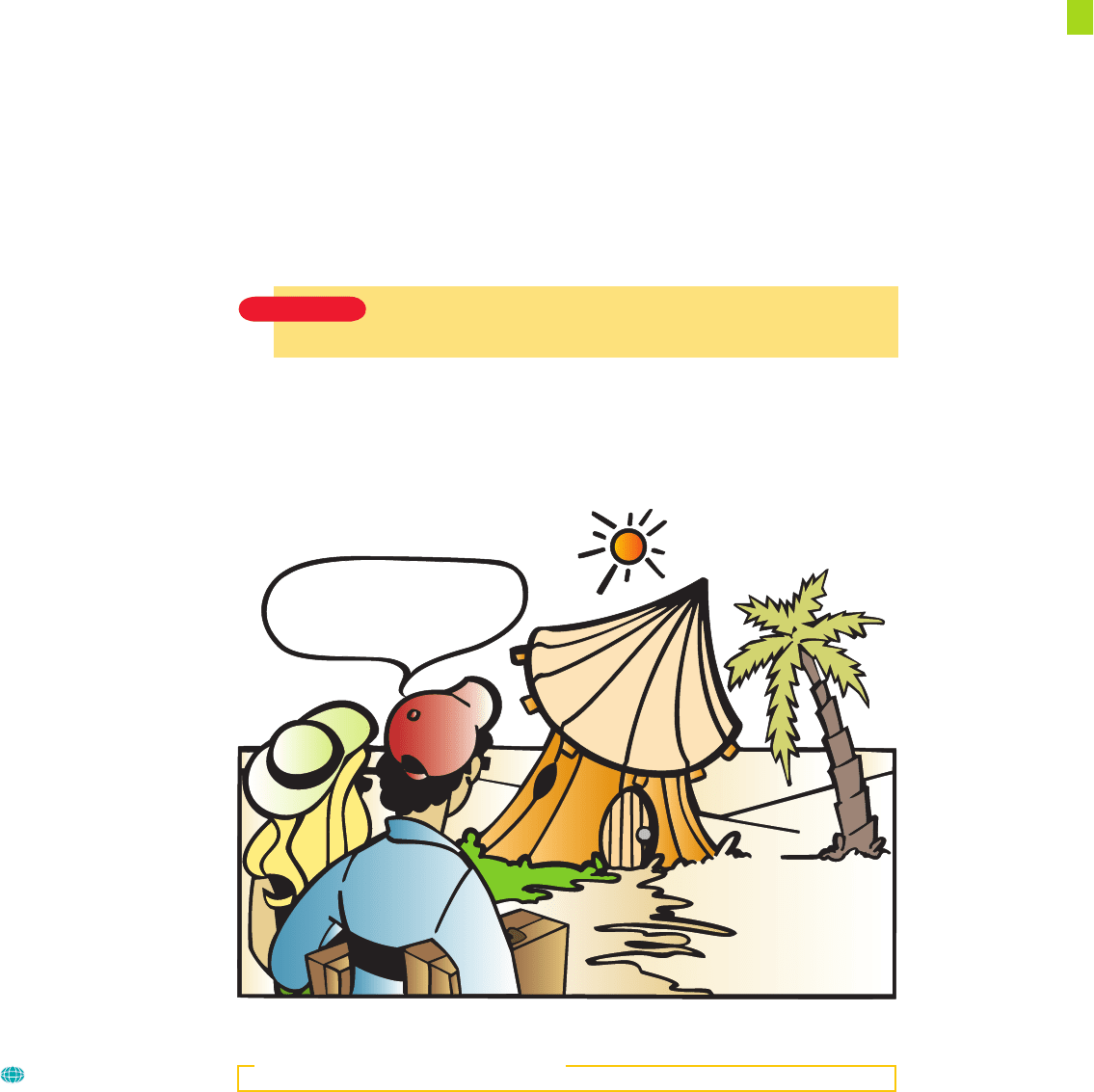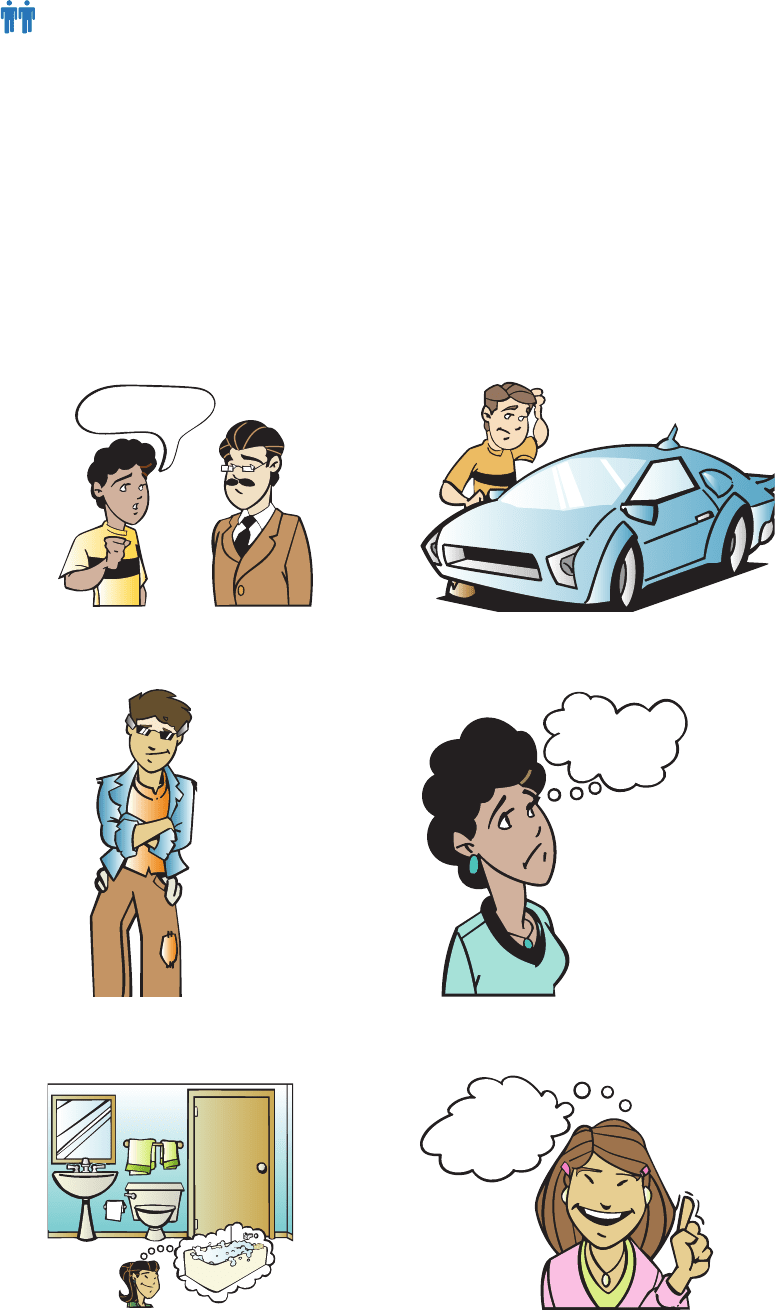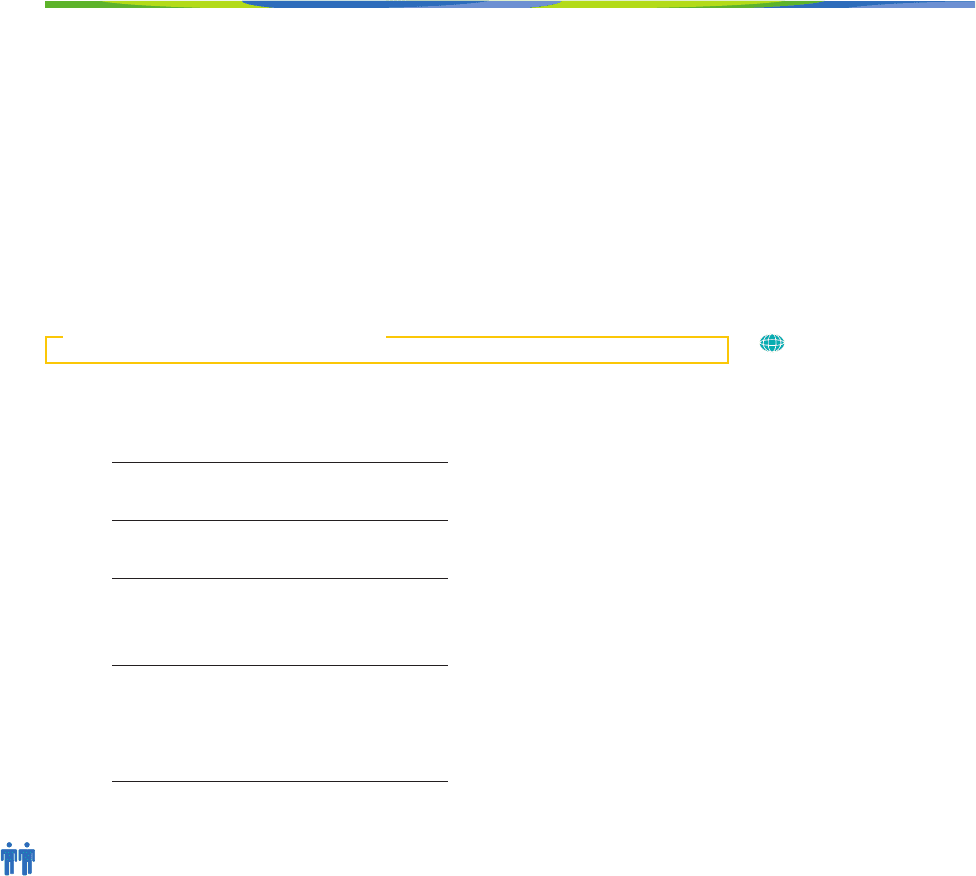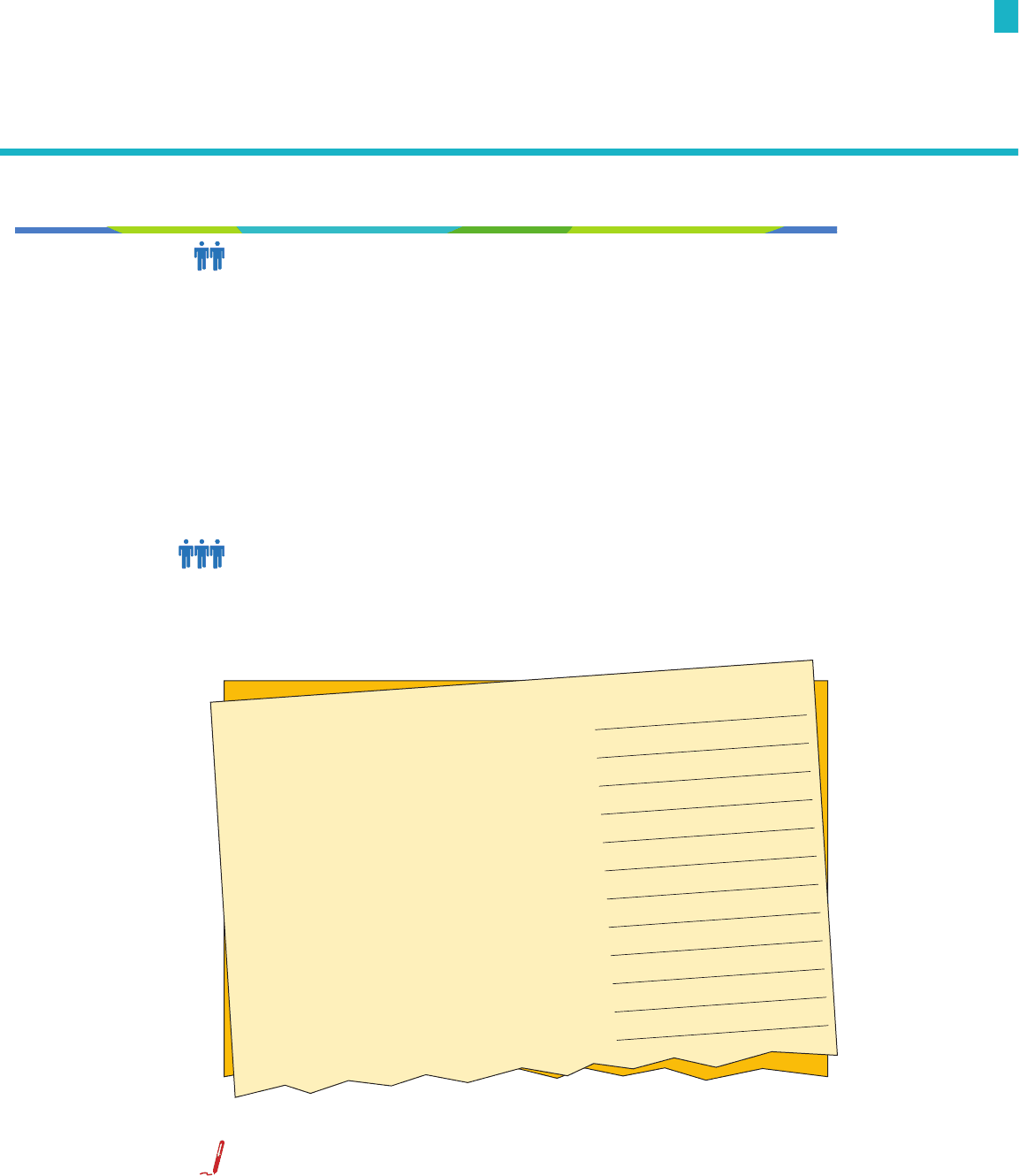Jarvis A., Lebredo R., Mena-Ayllon F. Hola, amigos! Worktext. Volume 1
Подождите немного. Документ загружается.


En la sala de emergencia
◆
trescientos uno 301
B. En el hospital With a partner, read the following statements and take
turns expressing doubt or certainty about them. Use dudo, no dudo, estoy
seguro(a), and no estoy seguro(a).
1. Todos los hospitales son gratis.
2. Las enfermeras trabajan solamente tres horas al día.
3. El médico puede desinfectar la herida.
4. Los paramédicos nunca vienen en la ambulancia.
5. Cualquier enfermera puede hacer una radiografía.
6. Si tienes un dolor en el pecho debes ir al hospital en seguida.
7. Los médicos ganan muy poco dinero.
8. Si te rompes una pierna necesitas usar muletas.
C. ¿Lo dudas...? With a partner, take turns telling each other three or four
things about yourself. Give some false information to see if your partner
doubts or doesn’t doubt what you say.
modelo: ◆ —Tengo ocho clases este semestre.
—Dudo que tengas ocho clases.
(Estoy seguro[a] de que no tienes ocho clases.)
Denial
When the main clause denies or negates what is expressed in the
subordinate clause, the subjunctive is used.
—Ana niega que Carlos sea su “An a denies that Carlos is her
novio. boyfriend.”
—Sí, dice que son amigos... “Yes, she says that they are
friends . . .”
—Ellos trabajan mucho y siempre “They work hard and always have
tienen dinero. money.”
—Es verdad que trabajan mucho, “It’s true that they work hard, but
pero no es cierto que siempre it’s not true that they always
tengan dinero. have money.”
Notice that when the main clause does not deny what is said in the
subordinate clause, the indicative is used.
¡Atención!
Es verdad que trabajan mucho. It’s true that they work hard.
Práctica y conversación
A. ¿Es verdad o no? With a partner, take turns saying whether each of the
following statements is true or not.
modelo:
◆ Toda la gente tiene reacciones alérgicas a todo.
No es verdad que toda la gente tenga reacciones alérgicas a todo.
1. Los médicos no trabajan en la sala de emergencia.
2. Generalmente hay muchos pacientes en la sala de emergencia.
3. Las enfermeras saben más que los médicos.
4. Los paramédicos van en las ambulancias.
5. Los médicos no cobran mucho.
6. Hoy hace mucho frío.
7. Está lloviendo.
8. Hoy hace buen tiempo.
For more practice with
lesson topics, find additional
resources on the ¡Hola, amigos!
Advantage Edition Website
at cengage.com/spanish/
holaamigos_adved.
Copyright 2010 Cengage Learning. All Rights Reserved. May not be copied, scanned, or duplicated, in whole or in part. Due to electronic rights, some third party content may be suppressed from the eBook and/or eChapter(s).
Editorial review has deemed that any suppressed content does not materially affect the overall learning experience. Cengage Learning reserves the right to remove additional content at any time if subsequent rights restrictions require it.

302 ¡trescientos dos
◆
Lección 13
Disbelief
The verb creer is followed by the subjunctive in negative sentences, where it
expresses disbelief.
—¿Teresa va al hospital hoy? “Is Teresa going to the hospital
today?”
—No, no creo que vaya hoy. “No, I don’t think she’s going
today.”
Creer is followed by the indicative in affirmative sentences, where it
expresses belief.
¡Atención!
—¿Qué va a pedir el médico? “What is the doctor going to ask for?”
—Creo que va a pedir unos “I think he is going to order
análisis. (ask for) some tests.
Práctica y conversación
A. El Sr. Contreras Mr. Contreras always contradicts everyone. How
would he react to these statements?
modelo: ◆ Creo que ese médico es muy bueno.
No creo que (ese médico) sea muy bueno.
1. No creo que el hospital sea caro.
2. Creo que todos los cuartos tienen aire acondicionado.
3. Creo que tienen que llevarlo a la sala de emergencia.
4. No creo que estén allí.
5. No creo que él necesite radiografías.
6. Creo que necesita usar muletas.
For more practice with
lesson topics, find additional
resources on the ¡Hola, amigos!
Advantage Edition Website
at cengage.com/spanish/
holaamigos_adved.
Dudo que tenga
aire acondicionado.
Copyright 2010 Cengage Learning. All Rights Reserved. May not be copied, scanned, or duplicated, in whole or in part. Due to electronic rights, some third party content may be suppressed from the eBook and/or eChapter(s).
Editorial review has deemed that any suppressed content does not materially affect the overall learning experience. Cengage Learning reserves the right to remove additional content at any time if subsequent rights restrictions require it.

En la sala de emergencia
◆
trescientos tres 303
B. En la universidad Use your imagination to complete each statement,
using the subjunctive or the indicative, as appropriate. Compare your
statements to those of your partner.
1. Yo creo que el profesor (la profesora)...
2. No es verdad que yo...
3. Es cierto que los estudiantes...
4. No creo que en la cafetería de la universidad...
5. No es verdad que la clase de español...
6. No es cierto que los norteamericanos...
7. Dudo que yo...
8. No estoy seguro(a) de que esta universidad...
C. Opiniones Use the illustrations to complete the following sentences.
Papá, ¿me das
diez mil dólares?
Beto
Papá
1. Yo no creo que el papá de Beto...
Carlos
3. No es verdad que Carlos...
5. No es cierto que el baño...
Paquito
2. Dudo que Paquito...
¡¡Hotel
Granada!!
$$$
Rita
4. Rita cree que el hotel Granada...
Esteban…
¡muy puntual!
Alicia
6. No es verdad que Esteban siempre...
Copyright 2010 Cengage Learning. All Rights Reserved. May not be copied, scanned, or duplicated, in whole or in part. Due to electronic rights, some third party content may be suppressed from the eBook and/or eChapter(s).
Editorial review has deemed that any suppressed content does not materially affect the overall learning experience. Cengage Learning reserves the right to remove additional content at any time if subsequent rights restrictions require it.

304 trescientos cuatro
◆
Lección 13
D. Viajando The following statements are made by someone who doesn’t
necessarily know what he or she is talking about. With a partner, take turns
saying whether or not you think the comments are true. Use creo, no creo,
dudo, estoy seguro(a), es verdad, or no es verdad.
1. Hay vuelos directos de Nueva York a Madrid.
2. El pasaje a Madrid cuesta 200 dólares.
3. Los estudiantes siempre viajan en primera clase.
4. Puedo viajar por España en tren.
5. Todas las ciudades españolas son muy pequeñas.
6. Hay hoteles elegantes en Barcelona.
7. En los hoteles de Madrid, todas las habitaciones tienen vista al mar.
8. Podemos viajar de Los Ángeles a Madrid en tren.
2. Subjunctive with certain conjunctions (El subjuntivo con
ciertas conjunciones)
Subjunctive after conjunctions of time
The subjunctive is used after conjunctions of time when the main clause
refers to a future action or is a command. Some conjunctions of time are:
cuando when tan pronto como,
hasta que until en cuanto as soon as
Note in the following examples that the action in the subordinate clause has
not yet taken place.
—¿Van Uds. a la pensión ahora? “Are you going to the boarding
house now?”
—No, vamos a esperar hasta que “No, we’re going to wait until
venga Eva. Eva comes.”
—Bueno, llámenme en cuanto “Okay, call me as soon as she
ella llegue. arrives.”
—¿Cuándo vas a comprar las “When are you going to buy the
muletas? crutches?”
—Cuando mi papá me dé el “When my dad gives me the
dinero. money.”
—¿Uds. van a llevar a Eva al “Are you going to take Eva to the
hospital? hospital?"
—Sí, vamos a llevarla tan pronto “Yes, we are going to take her as soon
como llegue la ambulancia. as the ambulance arrives.”
If the action has already taken place or if the speaker views the
action of the subordinate clause as a habitual occurrence, the indicative is used
after the conjunction of time.
¡Atención!
—¿Ya llamaste a Rodolfo? “Did you already call Rodolfo?”
—Sí, lo llamé en cuanto llegué. “Yes, I called him as soon as
I arrived.”
—¿Cuándo llamas a Rodolfo? “When do you call Rodolfo?”
—Siempre lo llamo cuando llego “I always call him when I arrive
del trabajo. from work.”
—¿Siempre lo esperas? “Do you always wait for him?”
—Sí, hasta que llega. “Yes, until he arrives.”
Copyright 2010 Cengage Learning. All Rights Reserved. May not be copied, scanned, or duplicated, in whole or in part. Due to electronic rights, some third party content may be suppressed from the eBook and/or eChapter(s).
Editorial review has deemed that any suppressed content does not materially affect the overall learning experience. Cengage Learning reserves the right to remove additional content at any time if subsequent rights restrictions require it.

En la sala de emergencia
◆
trescientos cinco 305
Conjunctions that always take the subjunctive
Certain conjunctions by their very meaning imply uncertainty or condition;
they are therefore always followed by the subjunctive. Examples include:
a menos que unless con tal (de) que provided that
antes de que before para que in order that, so that
en caso de que in case sin que without
—Voy a llamar a la enfermera “I’m going to call the nurse
para que me traiga las so that she’ll bring me the
radiografías. x-rays.”
—Llámela antes de que se vaya. “Call her before she leaves.”
—No puedo comprar la “I can’t buy the medicine
medicina sin que tú me des without you giving me the
el dinero. money.”
—Puedo dártelo ahora. “I can give it to you now.”
Práctica y conversación
A. Minidiálogos Complete the following dialogues, using the indicative or
the subjunctive of each verb. Then act them out with a partner.
1. desocupar / llegar
—¿Podemos limpiar el cuarto ahora?
—No, no podemos limpiarlo hasta que el paciente lo .
—¿Cuándo lo va a desocupar?
—En cuanto el taxi.
2. llegar / atender
—¿Qué va a hacer en cuanto al hospital?
— Voy a hablar con la recepcionista para que el médico me esta
tarde.
3. llamar
—¿Cuándo van a venir tus amigos?
—Tan pronto como yo los .
4. salir
—¿Los señores García te esperaron?
—Sí, me esperaron hasta que yo del hospital.
5. hablar / ver
— Cuando Ud. con el médico, dígale que el paciente no se siente
bien.
—Voy a decírselo en cuanto lo .
6. irse / salir
—¿Tú puedes hablar con los paramédicos antes de que ellos ?
—Sí, a menos que (ellos) muy temprano.
7. llegar
—¿Esperaste mucho tiempo para ver al médico?
—No, él siempre me atiende en cuanto yo .
8. dar
—¿Vas a comprar la medicina hoy?
—No sé. No puedo comprarla sin que mis padres me el dinero.
For more practice with
lesson topics, find additional
resources on the ¡Hola, amigos!
Advantage Edition Website
at cengage.com/spanish/
holaamigos_adved.
Copyright 2010 Cengage Learning. All Rights Reserved. May not be copied, scanned, or duplicated, in whole or in part. Due to electronic rights, some third party content may be suppressed from the eBook and/or eChapter(s).
Editorial review has deemed that any suppressed content does not materially affect the overall learning experience. Cengage Learning reserves the right to remove additional content at any time if subsequent rights restrictions require it.

306 trescientos seis
◆
Lección 13
B. Entreviste a su compañero(a) Interview your partner, using the
following questions.
1. ¿Siempre desayunas en cuanto te levantas?
2. ¿Siempre te lavas la cabeza cuando te bañas?
3. ¿Tú puedes salir de tu casa sin que nadie te vea?
4. ¿Qué le vas a decir a tu mejor amigo(a) cuando lo (la) veas?
5. ¿Tú llegas a veces a clase antes de que llegue el profesor (la profesora)?
6. ¿Qué vas a hacer para que el profesor (la profesora) te dé una “A” en esta
clase?
7. ¿A veces te quedas en la biblioteca hasta que la cierran?
8. ¿Qué vas a hacer tan pronto como llegues a tu casa?
3. First-person plural commands (El imperativo de la
primera persona del plural)
In Spanish, the first-person plural of an affirmative command (
◆
let’s ⫹ verb)
can be expressed in two ways:
by using the first-person plural of the present subjunctive.
◆
Preguntemos el precio de la Let’s ask the price of the room.
habitación.
by using the expression
◆
vamos a ⫹ infinitive.
Vamos a preguntar el precio Let’s ask the price of the room.
de la habitación.
The verb
◆
ir does not use the subjunctive form in the first-person plural
affirmative command.
Vamos al teatro. Let’s go to the theatre.
In a negative command, however, the subjunctive form is used.
No vayamos al teatro. Let’s not go to the theatre.
In all direct, affirmative commands, object pronouns are attached to the
◆
verb, and a written accent is then placed on the stressed syllable.
Comprémoslo. Let’s buy it.
Llamémoslos. Let’s call them.
If the pronouns nos or se are attached to the verb, the final -s of the verb is
dropped before adding the pronoun.
Sentémonos aquí. Let’s sit here.
Vistámonos ahora. Let’s get dressed now.
Démoselo a los niños. Let’s give it to the children.
—Vamos a Madrid. “Let’s go to Madrid.”
—No, no vayamos a Madrid; “No, let’s not go to Madrid;
quedémonos en Barcelona. let’s stay in Barcelona.”
—¿Dónde queda el Museo del “Where’s the Prado Museum
Prado? located?”
—No sé. Preguntémoselo “I don’t know. Let’s ask that
a ese señor. gentleman.”
Copyright 2010 Cengage Learning. All Rights Reserved. May not be copied, scanned, or duplicated, in whole or in part. Due to electronic rights, some third party content may be suppressed from the eBook and/or eChapter(s).
Editorial review has deemed that any suppressed content does not materially affect the overall learning experience. Cengage Learning reserves the right to remove additional content at any time if subsequent rights restrictions require it.

En la sala de emergencia
◆
trescientos siete 307
Práctica y conversación
A. ¿Qué hacemos...? With a partner, take turns saying what these people
should do in the following situations. Use the first person plural command.
Use pronouns wherever possible.
1. Tenemos mucha hambre.
2. Estamos en un restaurante y necesitamos el menú.
3. No sabemos qué vino tomar.
4. No queremos salir hoy.
5. No sabemos qué hacer este fin de semana.
6. Un amigo nuestro tuvo un accidente.
7. No sabemos el precio de la medicina.
8. Tenemos mucho calor.
9. Estamos cansados.
10. Tenemos sueño.
B. ¡Vamos a España! You and a classmate are making plans to go on
a trip to Spain. Take turns answering the following questions, using the
first-person plural command.
1. ¿A qué ciudad vamos?
2. ¿Cómo viajamos?
3. ¿Qué día y a qué hora salimos?
4. ¿Cuántas maletas llevamos?
5. ¿Nos hospedamos en un hotel o en una pensión?
6. ¿Pedimos una habitación con vista a la calle?
7. ¿Cuántos días nos quedamos en la ciudad?
8. ¿Comemos en un restaurante o en nuestra habitación?
9. ¿Dónde dejamos las joyas (jewelry)?
10. ¿Cuándo regresamos?
C. No estamos de acuerdo With a partner, play the roles of two people
who are trying to decide what to do, but can't agree on anything.
modelo: ◆ —Llevemos a los niños al cine.
—No, no los llevemos al cine. Llevémoslos al parque.
For more practice with
lesson topics, find additional
resources on the ¡Hola, amigos!
Advantage Edition Website
at cengage.com/spanish/
holaamigos_adved.
Rodeo
Summary of the Command Forms (Resumen de las formas
del imperativo)
Tú
Usted Ustedes Affirmative Negative Nosotros
hable hablen habla no hables hablemos
coma coman come no comas comamos
abra abran abre no abras abramos
cierre cierren cierra no cierres cerremos
vaya vayan ve no vayas vamos
1
1
Remember that the affirmative command uses the indicative form vamos, but the negative
command uses the subjunctive form no vayamos.
Copyright 2010 Cengage Learning. All Rights Reserved. May not be copied, scanned, or duplicated, in whole or in part. Due to electronic rights, some third party content may be suppressed from the eBook and/or eChapter(s).
Editorial review has deemed that any suppressed content does not materially affect the overall learning experience. Cengage Learning reserves the right to remove additional content at any time if subsequent rights restrictions require it.

308 trescientos ocho
◆
Lección 13
Notice that the command forms of these verbs are identical to the subjunctive
forms, except for the affirmative forms for tú, which use the third-person
singular of the present indicative. Also, the following verbs have irregular tú
command forms.
decir di ir ve salir sal tener ten
hacer haz poner pon ser sé venir ven
Remember the position of direct, indirect, and reflexive pronouns with
commands.
Affirmative Negative
Cómprelo. No lo compre.
Díselo. No se lo digas.
Levantémonos. No nos levantemos.
Práctica y conversación
A. Planes y más planes You and a partner are busy making plans for
a visit by some foreign students who will spend the weekend with you and
your friends. One of your neighbors, Sra. Vega, and her young daughter,
María, offer their help. Use the appropriate command form to say who is
going to do each of the following chores and categorize them under the
appropriate heading.
modelos: ◆ Comprar frutas
Nosotros: Compremos frutas.
la señora Vega: Compre frutas.
María: Compra frutas.
1. limpiar el apartamento
2. ir al mercado
3. poner la mesa
4. preparar la comida
5. hacer las camas
6. invitar a otros estudiantes
7. ir al aeropuerto a esperar a los viajeros (travelers)
8. sacar entradas para el teatro
9. no levantarse tarde
10. llevarlos a visitar los lugares de interés
11. servir la comida
12. lavar los platos
13. darles una fiesta de bienvenida
14. pedirle los discos compactos a Roberto
15. llevarlos a las tiendas
16. no olvidarse de sacar dinero del banco
B. Consejos y sugerencias With a partner, take turns telling two people
what to do about the following: what to eat and drink, what to do this
weekend, what clothes to buy, what to order at a restaurant, etc. The two
people are: Carlos, who is eighteen years old, and Sra. Fuentes, an older lady.
Then, decide what you are going to do together. Use appropriate commands.
For more practice with
lesson topics, find additional
resources on the ¡Hola,
amigos! Advantage Edition
Website at cengage.com/spanish/
holaamigos_adved.
Copyright 2010 Cengage Learning. All Rights Reserved. May not be copied, scanned, or duplicated, in whole or in part. Due to electronic rights, some third party content may be suppressed from the eBook and/or eChapter(s).
Editorial review has deemed that any suppressed content does not materially affect the overall learning experience. Cengage Learning reserves the right to remove additional content at any time if subsequent rights restrictions require it.

En la sala de emergencia
◆
trescientos nueve 309
4. ¿Qué? and ¿cuál? used with ser
(Qué y cuál usados con el verbo ser)
What?
◆
translates as ¿qué? when it is used as the subject of the verb and asks
for a definition.
—¿Qué es una paella? “What is a paella?”
—Es un plato español. “It’s a Spanish dish.”
What?
◆
translates as ¿cuál? when it is used as the subject of a verb and asks
for a choice. Cuál conveys the idea of selection from among several or many
available objects, ideas, and so on.
—¿Cuál es su número de teléfono? “What is your phone number?”
—712-4267. “712-4267.”
Práctica y conversación
A. ¿Cuál es la pregunta? Write the questions you would ask to get the
following information. Use qué or cuál, as needed.
1. —¿ ?
—El nombre del hotel es “El Alcázar”.
—¿ ?
—Calle del Prado, número 420.
—¿ ?
—6–35–42–37.
2. —Necesita mostrar su carnet de identidad.
—¿ ?
—Es una forma de identificación.
—¿Cuánto cuesta una habitación en este hotel?
—Cuesta doscientos euros.
—¿ ?
—Es la moneda (currency) de España.
B. Entreviste a su compañero(a) Interview your partner, using the
following questions.
1. ¿Cuál es el hotel que tú prefieres?
2. ¿Cuál es la ciudad que más te gusta?
3. ¿Cuál es el programa de televisión que prefieres?
4. ¿Cuál es la comida que más te gusta?
5. ¿Cuál es el lugar que prefieres para ir de vacaciones?
6. ¿Cuál es tu color favorito?
For more practice with
lesson topics, find additional
resources on the ¡Hola, amigos!
Advantage Edition Website
at cengage.com/spanish/
holaamigos_adved.
Copyright 2010 Cengage Learning. All Rights Reserved. May not be copied, scanned, or duplicated, in whole or in part. Due to electronic rights, some third party content may be suppressed from the eBook and/or eChapter(s).
Editorial review has deemed that any suppressed content does not materially affect the overall learning experience. Cengage Learning reserves the right to remove additional content at any time if subsequent rights restrictions require it.

310 trescientos diez
◆
Lección 13
Para conocernos mejor Get to know your partner better by asking each
other the following questions.
1. ¿Has tenido un accidente alguna vez?
2. ¿Te han llevado al hospital en una ambulancia alguna vez?
3. ¿Cuándo fue la última vez que estuviste en una sala de emergencia?
4. ¿Cuándo fue la última vez que te pusieron una inyección antitetánica?
5. ¿Qué tomas cuando te duele la cabeza? ¿Y cuando te duele el estómago?
6. ¿Te han hecho una radiografía últimamente?
7. ¿Te has desmayado alguna vez (ever)?
8. ¿Tu médico te ha recetado alguna medicina últimamente?
9. ¿Te has roto una pierna o un brazo alguna vez?
10. ¿Te has quemado una mano alguna vez?
Una encuesta Interview your classmates to identify who fits the following
descriptions. Include your instructor, but remember to use the Ud. form when
addressing him or her.
¡Conversemos!
Entre nosotros
Nombre
1. Se lastimó jugando al fútbol.
2. Toma pastillas para el dolor a veces.
3. Va a ir al médico el mes próximo.
4. No se siente bien hoy.
5. Se ha caído últimamente.
6. Estuvo en la sala de rayos X el mes pasado.
7. Va a tomar una medicina más tarde.
8. Nunca se ha desmayado.
9. Tiene problemas con el estómago a veces.
10. Ha tenido que ir al hospital últimamente.
11. Ha tenido una reacción alérgica recientemente.
12. Nunca ha chocado con otro coche.
Y ahora... Write a brief summary about what you have learned about your
classmates.
Copyright 2010 Cengage Learning. All Rights Reserved. May not be copied, scanned, or duplicated, in whole or in part. Due to electronic rights, some third party content may be suppressed from the eBook and/or eChapter(s).
Editorial review has deemed that any suppressed content does not materially affect the overall learning experience. Cengage Learning reserves the right to remove additional content at any time if subsequent rights restrictions require it.
